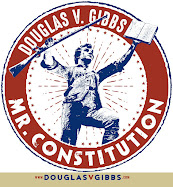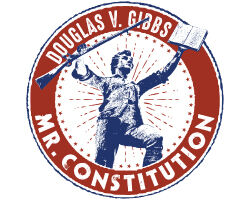By Douglas V. Gibbs
Author,
Speaker,
Instructor,
Radio HostIn
1814 the British conducted a full raid against Washington, D.C. The Americans were unprepared to defend the
capital. No fort, breastwork, or battery
had been built. The move by the British
was in retaliation of the burning of York in England the year before. The British marched unchecked to the city,
and then they burned the Capitol, the White House (although it was not called
The White House, yet, at that time), the treasury, the Library of Congress, and
other federal buildings. President
Madison and his Cabinet took refuge in Virginia. On the evening of August 24, as the White
House was aflame, Madison’s wife, Dolley Madison, returned to the building
rescuing the original portrait of George Washington, and the original copy of
the Declaration of Independence.
A
few days later Baltimore was attacked, but the citizens of Baltimore were ready
to defend their city. British General
Ross was killed in the attack, and all day on September 13 the British fleet
bombarded Fort McHenry at the entrance to the harbor. The spirited resistance on land and at the
fort eventually discouraged the British, who ultimately withdrew.
During
the onslaught of shells and rockets against Fort McHenry a 35-year-old
Washington lawyer, Francis Scott Key, found himself aboard a British ship
within sight of the fort. He had been
asked to negotiate a prisoner exchange between the British and the
Americans. After successful
negotiations, however, he was advised by the British that it was all for
naught, for the plan was to use the entire British Fleet to attack Fort McHenry
to force the Americans to drop to their knees and surrender. The sign of such a show of subservience to
the British Empire could be accomplished without an attack if only the men at
Fort McHenry would lower the American Flag waving over the rampart.
A
writer of occasional verse, the son of a distinguished judge who had referred
to the conflict as “abominable” and a “lump of wickedness,” and one who
believed the war could have been avoided with diplomatic accommodation, Key was
outraged by the British incursions into the Chesapeake Bay, and the plan to
attack a base that was also home to women and children. From the British vessel Key anxiously watched
the bombardment of Fort McHenry through the daylight hours of September
13. Key stated regarding the battle, “It
seemed as though mother earth had opened and was vomiting shot and shell in a
sheet of fire and brimstone.” As
darkness descended he could see little more than the “red glare” of the enemy’s
new gunpowder propelled Congreve rockets tracing fiery arcs across the
sky. He later wrote, “The heavens aglow
were a seething sea of flame.” The
stormy night provided conditions of an “angry sea,” and the flag-of-truce sloop
was “tossed as though in a tempest.” He
was alarmed by the “bombs bursting in air,” and he believed it to be unlikely
the American resistance could withstand such a pounding. Then, when the mists dissipated at dawn,
September 14, he learned the outcome of the battle. “At last,” he later wrote, “a bright streak
of gold mingled with crimson shot athwart the eastern sky, followed by another,
and still another, as the morning sun rose.”
Then he saw it. An American flag,
enormous in its dimensions, fluttering in the breeze from the flagpole of an
undefeated Fort McHenry. The fort had
not fallen. Baltimore was safe. It was a “most merciful deliverance.”
Seeing
the Stars and Stripes still waving, Francis Scott Key wrote a poem on a piece
of writing paper he pulled from his pocket.
In his lodging at a Baltimore inn the following day he polished the
draft, creating four stanzas. His
brother-in-law, Joseph Nicholson, a commander of a militia at Fort McHenry,
printed the poem for distribution to the public, titled, “Defence of Fort
M’Henry.” The verse was accompanied by
suggestion to the music of an old English drinking song. Within a week the poem made it to the pages
of the Baltimore Patriot newspaper, who pronounced it to be a “beautiful and
animating effusion” that is destined “long to outlive the impulse which
produced it.” Rechristened “The
Star-Spangled Banner” soon thereafter, Key’s words were, within weeks,
appearing in newspapers across America.
More
than a century would pass from its composition until in 1931 President Herbert
Hoover officially proclaimed it to be the national anthem of the United
States. Congress and Hoover gave the
song official status as our national anthem on March 3, 1931. The flag that inspired Key’s writing of the
poem eventually made its way to the Smithsonian, where it is being
painstakingly conserved in a climate-controlled laboratory where it serves as
the centerpiece of an exhibition at the National Museum of American History.
― The Star Spangled Banner ―
The
Star-Spangled Banner has four verses, but the first is the
one typically sang.
O
say can you see, by the dawn's early light,
What
so proudly we hailed at the twilight's last gleaming,
Whose
broad stripes and bright stars through the perilous fight,
O'er
the ramparts we watched, were so gallantly streaming?
And
the rocket's red glare, the bombs bursting in air,
Gave
proof through the night that our flag was still there;
O
say does that star-spangled banner yet wave
O'er
the land of the free and the home of the brave?
On
the shore dimly seen through the mists of the deep,
Where
the foe's haughty host in dread silence reposes,
What
is that which the breeze, o'er the towering steep,
As
it fitfully blows, half conceals, half discloses?
Now
it catches the gleam of the morning's first beam,
In
full glory reflected now shines in the stream:
'Tis
the star-spangled banner, O long may it wave
O'er
the land of the free and the home of the brave.
And
where is that band who so vauntingly swore
That
the havoc of war and the battle's confusion,
A
home and a country, should leave us no more?
Their
blood has washed out their foul footsteps' pollution.
No
refuge could save the hireling and slave
From
the terror of flight, or the gloom of the grave:
And
the star-spangled banner in triumph doth wave,
O'er
the land of the free and the home of the brave.
O
thus be it ever, when freemen shall stand
Between
their loved homes and the war's desolation.
Blest
with vict'ry and peace, may the Heav'n rescued land
Praise
the Power that hath made and preserved us a nation!
Then
conquer we must, when our cause it is just,
And
this be our motto: 'In God is our trust.'
And
the star-spangled banner in triumph shall wave
O'er
the land of the free and the home of the brave!
-- Political Pistachio Conservative News and Commentary






















